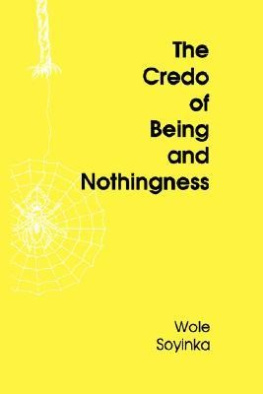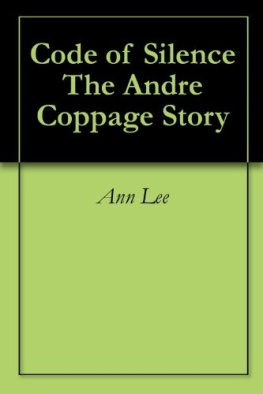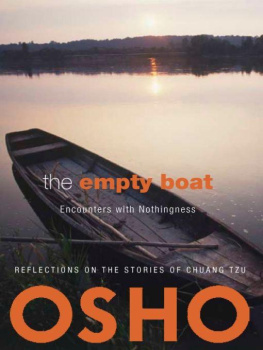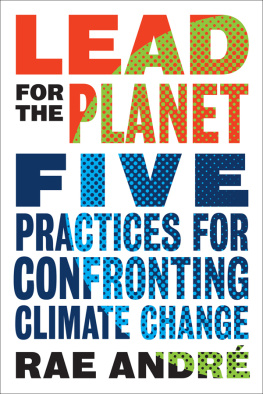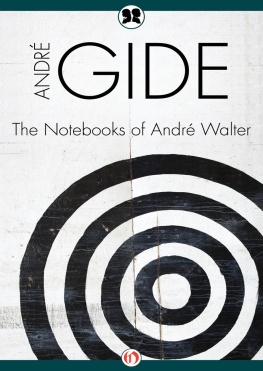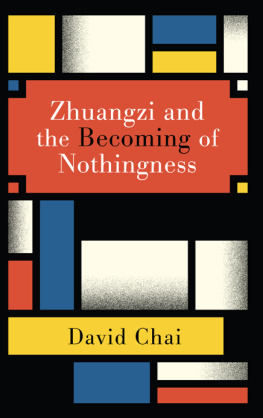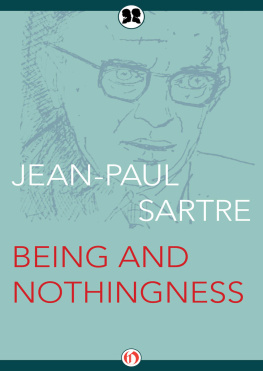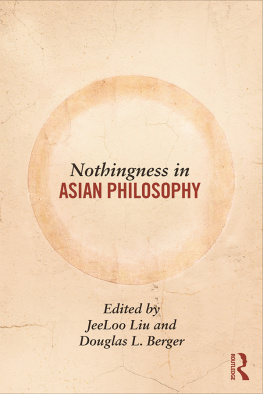Andre Halaw - God Is Nothingness: Awakening to Absolute Non-being
Here you can read online Andre Halaw - God Is Nothingness: Awakening to Absolute Non-being full text of the book (entire story) in english for free. Download pdf and epub, get meaning, cover and reviews about this ebook. year: 0, genre: Science fiction / Religion. Description of the work, (preface) as well as reviews are available. Best literature library LitArk.com created for fans of good reading and offers a wide selection of genres:
Romance novel
Science fiction
Adventure
Detective
Science
History
Home and family
Prose
Art
Politics
Computer
Non-fiction
Religion
Business
Children
Humor
Choose a favorite category and find really read worthwhile books. Enjoy immersion in the world of imagination, feel the emotions of the characters or learn something new for yourself, make an fascinating discovery.

- Book:God Is Nothingness: Awakening to Absolute Non-being
- Author:
- Genre:
- Year:0
- Rating:3 / 5
- Favourites:Add to favourites
- Your mark:
- 60
- 1
- 2
- 3
- 4
- 5
God Is Nothingness: Awakening to Absolute Non-being: summary, description and annotation
We offer to read an annotation, description, summary or preface (depends on what the author of the book "God Is Nothingness: Awakening to Absolute Non-being" wrote himself). If you haven't found the necessary information about the book — write in the comments, we will try to find it.
God Is Nothingness: Awakening to Absolute Non-being — read online for free the complete book (whole text) full work
Below is the text of the book, divided by pages. System saving the place of the last page read, allows you to conveniently read the book "God Is Nothingness: Awakening to Absolute Non-being" online for free, without having to search again every time where you left off. Put a bookmark, and you can go to the page where you finished reading at any time.
Font size:
Interval:
Bookmark:
God is Nothingness:
Awakening to Absolute Non-being
Andre Halaw
Copyright Andre Halaw 2014
I dedicate this book to one of the greatest sages this world has ever known, Sri Nisargadatta Maharaj. Your words opened my mind and heart to the magnificent reality of the Absolute. Praise be to you and the Parabrahman you reveal. With the humblest of intentions, I hope this book honors your teachings.
Special thanks to Ellen Marie Chen for her magnificent book, In Praise of Nothing: An Exploration of Daoist Fundamental Ontology. It was an invaluable resource, without which this present work would not have been impossible.
And to Nishida Kitaro, the brilliant founder of the Kyoto School. His insights into Nothingness have helped and challenged me beyond measure.
Charles S. Peirce
Only a fool or a man would believe that God is masculine.
Fathers dont create anything; mothers do.
Common wisdom
There is only one thing to be understood,
and that is that you are the formless, timeless unborn.
Nisargadatta Maharaj
A monk asked Chan Master Zhaozhou, Does a dog have Buddha nature?
Zhaozhou said, Wu [Nothing].
Wumenguan
All things are born of being; being is born of nonbeing [Nothing].
Tao Te Ching
Preface
This book is about Nothingness, the great Void of the holy sages, not to be confused with the nothing of the ordinary person.
Silence. A blank page or space in a book. A shout. Slapping the table or thumping the floor. These are all expressions of the ineffable truth that is the universal nature of reality. Since there is no way to directly capture the highest truth with language, all we can do is point to it.
And Nothingness is the best verbal pointer that I have found.
In the beginning, there was only Nothing.
Now there is only Nothing.
In the end, there will be only Nothing.
There always was, is,
and only ever will be
Nothing.
God is Nothingness
Christ is Nothingness
Buddha is Nothingness
The Tao is Nothingness
Brahman is Nothingness
The Absolute is Nothingness
Nothingness is neither something nor the common nothing;
it is the Great Nothing, the eternal, magnificent, all-encompassing
Nothingness that transcends being,
yet is the ground from which existence itself arises.
In truth, there is only Nothingness,
for nothing else ever was.
Beings suffer because they do
not understand Nothing.
Intoxicated by their senses and minds,
they chase mirages,
construct temples,
conduct empty rituals,
pursue wealth and status,
believing that there is some thing
meaning, purpose, salvation
to attain.
Fools are slaves to their senses and thoughts,
caught in the snare of form and desire,
unaware that all things
arise from Nothingness,
abide as Nothingness,
and return to Nothingness.
For nothing has ever happened.
Existence and appearance are flashes of Nothingness
superimposed upon Nothingness.
There are no beings, no worlds,
no minds, no consciousness,
no souls, no events, no time,
no space, no Buddha, no Christ,
no Self, no God.
There is only the not-that That
the Great, Magnificent Void,
the womb of all existence.
NOTHINGNESS.
Bound by neither space nor time,
Nothingness is dimension-less,
time-less, and form-less.
The Void is unborn, unoriginated, unconditioned, and deathless,
neither coming nor going, creating nor destroying, rewarding nor punishing.
It has never set anything in motion nor caused anything to happen.
Ultimately, there is only Nothing,
which is the final and only truth.
Nothingness cannot be seen with eyes,
nor heard with ears,
tasted with the tongue,
smelt with the nose,
felt by the body,
or known by the mind.
Do not look for it with your senses or mind,
for the Void is beyond color, sound,
smell, taste, touch, form, and
thought.
Transcend them and realize that you are truly
Nothing, that in reality
there is only Nothing.
Then you are free to dance and play
on the waves of Nothingness.
Introduction
This may sound like a very strange book for a Buddhist to write. After all, Buddhism is by and large non-theistic, and not very concerned with the priorities of theistic religions, such as creationism, an afterlife (at least an eternal one), or the fulfillment of prophecy. This, paradoxically, makes Buddhists perfect candidates to write about Godbecause we are not constrained by any theological doctrine whatsoever. Unlike a theologian or theist of any sort, I do not have any sectarian position to defend. This affords me the advantage of an outsiders perspective.
That and I am an atheist. At least I am inasmuch as I do not believe in any traditional, anthropomorphic Creator with human priorities or intelligence. I am, however, aware of the formless reality at the root of all mundane existence. Buddhists call this Nirvana, Dharmata, Tathata, or Dharmakaya; Advaita Vedantins Brahman; Taoists the Tao; and so on.
Astute readers may have noticed that I omitted mentioning God and any theistic religions in the previous example; this is because the term has so many connotations to so many different people that it is difficult to know exactly what people mean when they say, God.
To a New-Ager it might refer to everything.
To Wiccans it may mean Goddess or the Mother.
To a Catholic it represents the Holy Trinity.
To an Evangelical Christian
You get the idea. God is often a mish-mash, blanket term that can refer to anything from the physical cosmos to a higher order or principle governing the universe; it can point to objective matter or a Being who transcends the material world altogether. The word can be very confusing because it encompasses so many varied concepts, expressing everything from an object of deep religious veneration to a meaningless verbal expression (as in, Oh my God).
This is why I generally I avoid using the word. In the many Dharma talks I have delivered as a Zen Buddhist teacher, I have uttered God on perhaps three or four occasions, and primarily for dramatic effect.
I dont oppose the word on a religious basis, but on a semantic one; for as a high school English teacher, I always encourage my students to use language with exactitude. Whenever I hear people utter the word God, I wonder what they mean, to which of the myriad definitions they are referring.
So I will be very clear from the start how I will be using the word God throughout the book. God is...Nothingness.
Defining Nothingness is my first and last goal, not the relative nothing that stands opposite to something, but Nothing with a capital N. And I assure you that there are worlds of difference between the two, as wide of a gulf as between an atom and an atom bomb.
The Nothing that I refer to has no opposite; it is the nebulous source and true nature of all that exists. The statement God is Nothingness, is not the same as saying God does not exist, quite the opposite, in fact.
Next pageFont size:
Interval:
Bookmark:
Similar books «God Is Nothingness: Awakening to Absolute Non-being»
Look at similar books to God Is Nothingness: Awakening to Absolute Non-being. We have selected literature similar in name and meaning in the hope of providing readers with more options to find new, interesting, not yet read works.
Discussion, reviews of the book God Is Nothingness: Awakening to Absolute Non-being and just readers' own opinions. Leave your comments, write what you think about the work, its meaning or the main characters. Specify what exactly you liked and what you didn't like, and why you think so.

